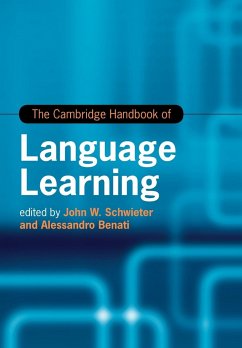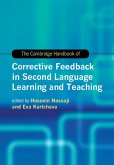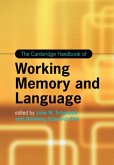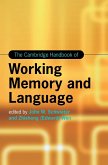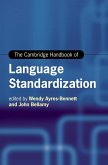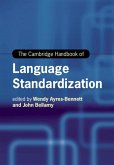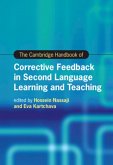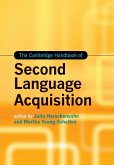The Cambridge Handbook of Language Learning
Herausgeber: Schwieter, John W.; Benati, Alessandro
The Cambridge Handbook of Language Learning
Herausgeber: Schwieter, John W.; Benati, Alessandro
- Broschiertes Buch
- Merkliste
- Auf die Merkliste
- Bewerten Bewerten
- Teilen
- Produkt teilen
- Produkterinnerung
- Produkterinnerung
A cutting-edge handbook that surveys the nature of second language learning and the implications for teaching. Contributors discuss prominent theories and methods in the field that are organized across thematic sections dealing with skill development, individual differences, pedagogical interventions and approaches, and context and environment.
Andere Kunden interessierten sich auch für
![The Cambridge Handbook of Corrective Feedback in Second Language Learning and Teaching The Cambridge Handbook of Corrective Feedback in Second Language Learning and Teaching]() The Cambridge Handbook of Corrective Feedback in Second Language Learning and Teaching51,99 €
The Cambridge Handbook of Corrective Feedback in Second Language Learning and Teaching51,99 €![The Cambridge Handbook of Working Memory and Language The Cambridge Handbook of Working Memory and Language]() The Cambridge Handbook of Working Memory and Language52,99 €
The Cambridge Handbook of Working Memory and Language52,99 €![The Cambridge Handbook of Working Memory and Language The Cambridge Handbook of Working Memory and Language]() The Cambridge Handbook of Working Memory and Language156,99 €
The Cambridge Handbook of Working Memory and Language156,99 €![The Cambridge Handbook of Language Standardization The Cambridge Handbook of Language Standardization]() The Cambridge Handbook of Language Standardization162,99 €
The Cambridge Handbook of Language Standardization162,99 €![The Cambridge Handbook of Language Standardization The Cambridge Handbook of Language Standardization]() The Cambridge Handbook of Language Standardization51,99 €
The Cambridge Handbook of Language Standardization51,99 €![The Cambridge Handbook of Corrective Feedback in Second Language Learning and Teaching The Cambridge Handbook of Corrective Feedback in Second Language Learning and Teaching]() The Cambridge Handbook of Corrective Feedback in Second Language Learning and Teaching206,99 €
The Cambridge Handbook of Corrective Feedback in Second Language Learning and Teaching206,99 €![The Cambridge Handbook of Second Language Acquisition The Cambridge Handbook of Second Language Acquisition]() The Cambridge Handbook of Second Language Acquisition53,99 €
The Cambridge Handbook of Second Language Acquisition53,99 €-
-
-
A cutting-edge handbook that surveys the nature of second language learning and the implications for teaching. Contributors discuss prominent theories and methods in the field that are organized across thematic sections dealing with skill development, individual differences, pedagogical interventions and approaches, and context and environment.
Hinweis: Dieser Artikel kann nur an eine deutsche Lieferadresse ausgeliefert werden.
Hinweis: Dieser Artikel kann nur an eine deutsche Lieferadresse ausgeliefert werden.
Produktdetails
- Produktdetails
- Cambridge Handbooks in Language and Linguistics
- Verlag: Cambridge University Press
- Seitenzahl: 832
- Erscheinungstermin: 7. Oktober 2021
- Englisch
- Abmessung: 244mm x 170mm x 44mm
- Gewicht: 1418g
- ISBN-13: 9781108430289
- ISBN-10: 1108430287
- Artikelnr.: 62150854
- Herstellerkennzeichnung
- Libri GmbH
- Europaallee 1
- 36244 Bad Hersfeld
- gpsr@libri.de
- Cambridge Handbooks in Language and Linguistics
- Verlag: Cambridge University Press
- Seitenzahl: 832
- Erscheinungstermin: 7. Oktober 2021
- Englisch
- Abmessung: 244mm x 170mm x 44mm
- Gewicht: 1418g
- ISBN-13: 9781108430289
- ISBN-10: 1108430287
- Artikelnr.: 62150854
- Herstellerkennzeichnung
- Libri GmbH
- Europaallee 1
- 36244 Bad Hersfeld
- gpsr@libri.de
Introduction John W. Schwieter and Alessandro Benati; Part I. Theories: 1.
Formal linguistic approaches to adult L2 acquisition and processing Jason
Rothman, Fatih Bayram, Ian Cunnings and Jorge González Alonso; 2. Cognitive
approaches to second language acquisition Nick C. Ellis and Stefanie Wulff;
3. The qualitative science of Vygotskian sociocultural psychology Rémi A.
Van Compernolle; 4. Theoretical frameworks in L2 acquisition John Truscott
and Michael Sharwood Smith; Part II. Methods: 5. Qualitative classroom
methods Peter I. De Costa, Wendy Li and Hima Rawal; 6. Experimental studies
in L2 classrooms Charlene Polio and Jongbong Lee; 7. Action research:
developments, characteristics, and future directions Anne Burns; 8.
Classroom observational research Nina Spada; 9. Psycholinguistic and
neurolinguistic methods Leah Roberts; Part III. Skill Development: 10.
Interaction in L2 learning Jaemyung Goo; 11. Speaking Dustin Crowther and
Susan M. Gass; 12. Second language listening: current ideas, current issues
John Field; 13. Contemporary perspectives on L2 upper-register text
processing Elizabeth B. Bernhardt and Cici Malik Leffell; 14. Language
learning through writing: theoretical perspectives and empirical evidence
Rosa M. Manchón and Olena Vasylets; Part IV. Individual Differences: 15.
Working memory in language learning and processing Zhisheng Wen and
Shaofeng Li; 16. Language aptitudes in L2 acquisition Gisela Granena; 17.
Language learner motivation: what motivates motivation researchers? Stephen
Ryan; 18. A new look at age: young and old L2 learners Carmen Muñoz; 19.
Identity Ron Darvin and Bonny Norton; Part V. Pedagogical Interventions and
Approaches: 20. Pedagogical interventions to L2 grammar instruction
Alessandro Benati and John W. Schwieter; 21. Task-based language learning
Michael H. Long, Jiyong Lee and Kyoko Kobayashi Hillman; 22. Task and
syllabus design for morphologically-complex languages Roger Gilabert and
Joan Castellví; 23. Proficiency guidelines and frameworks David Little; 24.
Technology-mediated language learning Carol Chapelle; 25. Content-based L2
teaching Hossein Nassaji and Eva Kartchava; 26. Conceptions of L2 learning
in critical language pedagogy Graham Crookes; Part VI. Context and
Environment: 27. Bilingual education and policy Christine Hélot and Ofelia
García; 28. Heritage language instruction Kim Potowski and Sarah J. Shin;
29. Minority languages at home and abroad: education and acculturation
Aline Ferreira, Viola G. Miglio and John W. Schwieter; 30. Study abroad and
immersion Jane Jackson and John W. Schwieter; 31. Teacher education: past,
present, and future Peter Swanson; Part VII. Moving Forward: 32. Future
directions in language learning and teaching Susan M. Gass.
Formal linguistic approaches to adult L2 acquisition and processing Jason
Rothman, Fatih Bayram, Ian Cunnings and Jorge González Alonso; 2. Cognitive
approaches to second language acquisition Nick C. Ellis and Stefanie Wulff;
3. The qualitative science of Vygotskian sociocultural psychology Rémi A.
Van Compernolle; 4. Theoretical frameworks in L2 acquisition John Truscott
and Michael Sharwood Smith; Part II. Methods: 5. Qualitative classroom
methods Peter I. De Costa, Wendy Li and Hima Rawal; 6. Experimental studies
in L2 classrooms Charlene Polio and Jongbong Lee; 7. Action research:
developments, characteristics, and future directions Anne Burns; 8.
Classroom observational research Nina Spada; 9. Psycholinguistic and
neurolinguistic methods Leah Roberts; Part III. Skill Development: 10.
Interaction in L2 learning Jaemyung Goo; 11. Speaking Dustin Crowther and
Susan M. Gass; 12. Second language listening: current ideas, current issues
John Field; 13. Contemporary perspectives on L2 upper-register text
processing Elizabeth B. Bernhardt and Cici Malik Leffell; 14. Language
learning through writing: theoretical perspectives and empirical evidence
Rosa M. Manchón and Olena Vasylets; Part IV. Individual Differences: 15.
Working memory in language learning and processing Zhisheng Wen and
Shaofeng Li; 16. Language aptitudes in L2 acquisition Gisela Granena; 17.
Language learner motivation: what motivates motivation researchers? Stephen
Ryan; 18. A new look at age: young and old L2 learners Carmen Muñoz; 19.
Identity Ron Darvin and Bonny Norton; Part V. Pedagogical Interventions and
Approaches: 20. Pedagogical interventions to L2 grammar instruction
Alessandro Benati and John W. Schwieter; 21. Task-based language learning
Michael H. Long, Jiyong Lee and Kyoko Kobayashi Hillman; 22. Task and
syllabus design for morphologically-complex languages Roger Gilabert and
Joan Castellví; 23. Proficiency guidelines and frameworks David Little; 24.
Technology-mediated language learning Carol Chapelle; 25. Content-based L2
teaching Hossein Nassaji and Eva Kartchava; 26. Conceptions of L2 learning
in critical language pedagogy Graham Crookes; Part VI. Context and
Environment: 27. Bilingual education and policy Christine Hélot and Ofelia
García; 28. Heritage language instruction Kim Potowski and Sarah J. Shin;
29. Minority languages at home and abroad: education and acculturation
Aline Ferreira, Viola G. Miglio and John W. Schwieter; 30. Study abroad and
immersion Jane Jackson and John W. Schwieter; 31. Teacher education: past,
present, and future Peter Swanson; Part VII. Moving Forward: 32. Future
directions in language learning and teaching Susan M. Gass.
Introduction John W. Schwieter and Alessandro Benati; Part I. Theories: 1.
Formal linguistic approaches to adult L2 acquisition and processing Jason
Rothman, Fatih Bayram, Ian Cunnings and Jorge González Alonso; 2. Cognitive
approaches to second language acquisition Nick C. Ellis and Stefanie Wulff;
3. The qualitative science of Vygotskian sociocultural psychology Rémi A.
Van Compernolle; 4. Theoretical frameworks in L2 acquisition John Truscott
and Michael Sharwood Smith; Part II. Methods: 5. Qualitative classroom
methods Peter I. De Costa, Wendy Li and Hima Rawal; 6. Experimental studies
in L2 classrooms Charlene Polio and Jongbong Lee; 7. Action research:
developments, characteristics, and future directions Anne Burns; 8.
Classroom observational research Nina Spada; 9. Psycholinguistic and
neurolinguistic methods Leah Roberts; Part III. Skill Development: 10.
Interaction in L2 learning Jaemyung Goo; 11. Speaking Dustin Crowther and
Susan M. Gass; 12. Second language listening: current ideas, current issues
John Field; 13. Contemporary perspectives on L2 upper-register text
processing Elizabeth B. Bernhardt and Cici Malik Leffell; 14. Language
learning through writing: theoretical perspectives and empirical evidence
Rosa M. Manchón and Olena Vasylets; Part IV. Individual Differences: 15.
Working memory in language learning and processing Zhisheng Wen and
Shaofeng Li; 16. Language aptitudes in L2 acquisition Gisela Granena; 17.
Language learner motivation: what motivates motivation researchers? Stephen
Ryan; 18. A new look at age: young and old L2 learners Carmen Muñoz; 19.
Identity Ron Darvin and Bonny Norton; Part V. Pedagogical Interventions and
Approaches: 20. Pedagogical interventions to L2 grammar instruction
Alessandro Benati and John W. Schwieter; 21. Task-based language learning
Michael H. Long, Jiyong Lee and Kyoko Kobayashi Hillman; 22. Task and
syllabus design for morphologically-complex languages Roger Gilabert and
Joan Castellví; 23. Proficiency guidelines and frameworks David Little; 24.
Technology-mediated language learning Carol Chapelle; 25. Content-based L2
teaching Hossein Nassaji and Eva Kartchava; 26. Conceptions of L2 learning
in critical language pedagogy Graham Crookes; Part VI. Context and
Environment: 27. Bilingual education and policy Christine Hélot and Ofelia
García; 28. Heritage language instruction Kim Potowski and Sarah J. Shin;
29. Minority languages at home and abroad: education and acculturation
Aline Ferreira, Viola G. Miglio and John W. Schwieter; 30. Study abroad and
immersion Jane Jackson and John W. Schwieter; 31. Teacher education: past,
present, and future Peter Swanson; Part VII. Moving Forward: 32. Future
directions in language learning and teaching Susan M. Gass.
Formal linguistic approaches to adult L2 acquisition and processing Jason
Rothman, Fatih Bayram, Ian Cunnings and Jorge González Alonso; 2. Cognitive
approaches to second language acquisition Nick C. Ellis and Stefanie Wulff;
3. The qualitative science of Vygotskian sociocultural psychology Rémi A.
Van Compernolle; 4. Theoretical frameworks in L2 acquisition John Truscott
and Michael Sharwood Smith; Part II. Methods: 5. Qualitative classroom
methods Peter I. De Costa, Wendy Li and Hima Rawal; 6. Experimental studies
in L2 classrooms Charlene Polio and Jongbong Lee; 7. Action research:
developments, characteristics, and future directions Anne Burns; 8.
Classroom observational research Nina Spada; 9. Psycholinguistic and
neurolinguistic methods Leah Roberts; Part III. Skill Development: 10.
Interaction in L2 learning Jaemyung Goo; 11. Speaking Dustin Crowther and
Susan M. Gass; 12. Second language listening: current ideas, current issues
John Field; 13. Contemporary perspectives on L2 upper-register text
processing Elizabeth B. Bernhardt and Cici Malik Leffell; 14. Language
learning through writing: theoretical perspectives and empirical evidence
Rosa M. Manchón and Olena Vasylets; Part IV. Individual Differences: 15.
Working memory in language learning and processing Zhisheng Wen and
Shaofeng Li; 16. Language aptitudes in L2 acquisition Gisela Granena; 17.
Language learner motivation: what motivates motivation researchers? Stephen
Ryan; 18. A new look at age: young and old L2 learners Carmen Muñoz; 19.
Identity Ron Darvin and Bonny Norton; Part V. Pedagogical Interventions and
Approaches: 20. Pedagogical interventions to L2 grammar instruction
Alessandro Benati and John W. Schwieter; 21. Task-based language learning
Michael H. Long, Jiyong Lee and Kyoko Kobayashi Hillman; 22. Task and
syllabus design for morphologically-complex languages Roger Gilabert and
Joan Castellví; 23. Proficiency guidelines and frameworks David Little; 24.
Technology-mediated language learning Carol Chapelle; 25. Content-based L2
teaching Hossein Nassaji and Eva Kartchava; 26. Conceptions of L2 learning
in critical language pedagogy Graham Crookes; Part VI. Context and
Environment: 27. Bilingual education and policy Christine Hélot and Ofelia
García; 28. Heritage language instruction Kim Potowski and Sarah J. Shin;
29. Minority languages at home and abroad: education and acculturation
Aline Ferreira, Viola G. Miglio and John W. Schwieter; 30. Study abroad and
immersion Jane Jackson and John W. Schwieter; 31. Teacher education: past,
present, and future Peter Swanson; Part VII. Moving Forward: 32. Future
directions in language learning and teaching Susan M. Gass.

